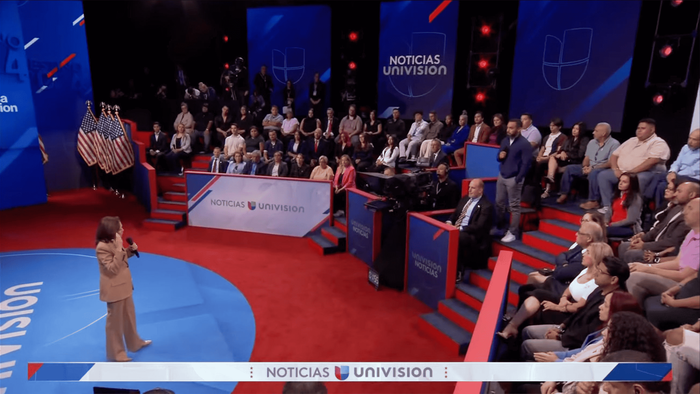Independent journalist Michael Tracey, in collaboration with Glenn Greenwald, has exposed a significant scandal surrounding a recent town hall event featuring Vice President Kamala Harris, hosted by Univision. The event was promoted as an opportunity for “undecided Latino voters” to engage with Harris and assess her candidacy ahead of the upcoming presidential election. However, Tracey, who observed the event from a separate room, quickly realized that this representation was misleading. Instead of a diverse group of undecided voters, the audience primarily consisted of declared Harris supporters, raising questions about the authenticity of the event and its intended audience.
The event took place at the University of Nevada, Las Vegas, and participants were promised a platform to voice their concerns directly to the Vice President. Yet, as Tracey discovered, many attendees were merely present to exhibit their pre-existing support for Harris rather than to express uncertainty about their voting decisions. A participant confided that they were already committed to voting for Harris prior to attending, while another confirmed a similar sentiment. This helped reveal that the advertising of the event as being geared toward undecided voters was not only misleading but strategically crafted to present a false narrative of engagement and dialogue.
Tracey further investigated how the audience was selected, revealing that a company named FansOnQ was responsible for filling the seats with individuals who were primarily supportive of Harris. This company, typically involved in events like the Latin Grammy Awards, was tasked with casting calls to recruit attendees. Some individuals who gained entry had connections to progressive organizations, further indicating that many in attendance were anything but undecided. The presence of “seat-fillers” meant that those who were actually engaged in the more meaningful interaction of asking questions had been flown in from across the country, raising further doubts about the event’s legitimacy and transparency.
The environment of the town hall event was tightly controlled, with restrictions placed on reporters attempting to interview the people who posed questions to Harris. Requests for interviews with these audience members were denied, raising red flags about the overall authenticity of the event and its intent. Even journalists from established outlets faced barriers when seeking to probe deeper into the proceedings, with the communications director for Univision dismissing inquiries about the nature of the audience and the selection process involving unexpected secrecy.
As the event unfolded, Tracey noted the lack of substantive policy discussion from Harris, which was aligned with the overall pretense of a participatory forum. Instead, the event functioned more like a carefully orchestrated performance, crafting an image of genuine interaction while doing little to address the more pressing issues facing Latino voters or providing substantial answers to their concerns. This mirrored a trend in political events where the nature of town halls has shifted from authentic, community-driven dialogues into slick productions resembling televised award shows, deviating significantly from their traditional purpose.
Tracey concluded his analysis by reflecting on the implications of such conducted town halls for democracy and political engagement. The notion of a town hall as a venue for open dialogue and citizen inquiry has significantly evolved, often prioritizing production value over authentic interaction. These modern iterations of town halls, while marketed as opportunities for discourse, tend to serve the interests of political narratives and media optics rather than genuinely addressing the concerns of constituents, leading to an erosion of trust between political figures and the communities they seek to engage.

